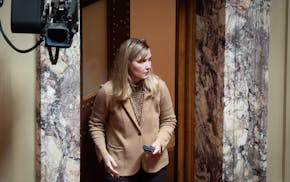Keeping bees in Minneapolis might become a little less sticky.
Beekeepers no longer would need written approval from neighbors to start hives on their property and would be free of restrictions on hives located on the second or higher story of a building under an ordinance change approved Monday by the City Council's health and environment committee.
"Since we've started allowing beekeeping, I've gotten very few complaints," said Council Member Cam Gordon, committee chairman.
The loosening of restrictions comes at a time of growing concern about bee die-offs and a revival of interest in back-yard beekeeping.
"I think the whole popularity of bees has just increased enormously, and now we're hearing more and more concerns about how critical it is to have a healthy bee population if we expect to have a food supply," Gordon said.
The amended ordinance will be sent to the City Council for a vote in coming weeks.
Minneapolis Animal Care and Control has required honeybee permit applicants to receive signatures of consent from at least 80 percent of the residents within 100 feet of their property and full approval from neighbors immediately adjacent to the applicant's property. These restrictions took many applicants weeks to fulfill and prevented others from obtaining legal permission to keep bees.
The new regulations require beekeepers only to notify neighbors annually. Those who fail to provide evidence of yearly notification to Animal Control could face citations or have their permit revoked.
The council legalized beekeeping in 2009, but required beekeepers to hold a permit — a stipulation also required in St. Paul. Honeybee permits cost $100 and, until recently, required an additional $50 renewal fee each year.
About 50 permits have been approved since Minneapolis revoked the beekeeping ban, Animal Control officials said.
Kristy Allen of Beez Kneez, a honeybee education and advocacy group that delivers raw honey on a bicycle, commended the committee for recognizing the societal benefit of the docile insects.
When Allen began asking some of her neighbors for signatures of approval, all were on board except for one man. He was vehemently opposed to the idea of having the bees around, she said, so she wrote him a letter outlining the need for bees and explained that they keep to themselves unless disturbed. Then she dropped off a jar of honey.
He came around, she said.
"A lot of people just aren't educated about bees," she said. "The good part of this amendment is that you're still notifying neighbors, but they can't say no due to a lack of knowledge."
Loosening restrictions should save beekeepers a great deal of time and energy, said CARAG neighborhood resident Pam Price.
In order for Price to receive her honeybee permit three years ago, she had to get 24 neighbors to consent, which took about three weeks. It didn't take much convincing — even a neighbor who was highly allergic to bee stings approved her endeavor — but the problem was that some residents were out of town for extended periods, she said.
"It truly did get to the point where we were stalking cars in the alley," she said.
The permit process was also stressful because bees can be purchased only once a year, she said. Price had ordered her bees and was still trying to get approval from the city just before they arrived in April 2012. Now she has tens of thousands buzzing around her back yard.
Price and her boyfriend often sit outside and watch the insects work through binoculars. Her closest neighbors to the hive even planted flowers along the property line to welcome the bees and give them something to pollinate, she said, but few others notice their presence.
"Even though they knew we were getting bees, there's so little impact on the other neighbors that months after they signed the petition, they were coming up to us saying, 'When are you gonna get your bees?' " she said. "You can't see our hives from the alley or the street. You have to be invited into our yard to see them."
Liz Sawyer • 612-673-4648

Lakeville teachers, district reach tentative contract agreement

Pulitzer Prize winner Hernan Diaz, Oscar-anointed Percival Everett and bestseller Rebecca Makkai coming to Hopkins for Pen Pals

Meet the affordable housing champion fighting for St. Paul's West Side
